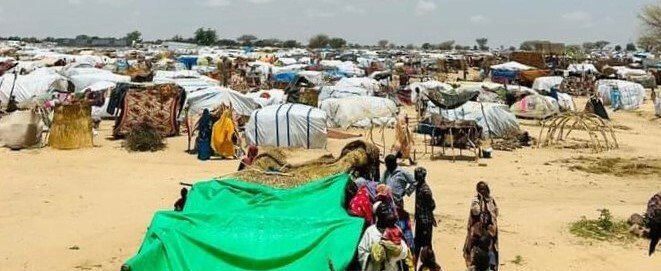In an exclusive interview with Adam Siyam Mohammed, a Sudanese refugee at Adré Refugee Camp in eastern Chad, we delve into the struggles and aspirations of those displaced by conflict. From educational gaps to healthcare challenges, Adam shares his insights on the pressing issues facing the camp’s residents.
Below are edited excerpts:
Question: Hi there! Can you tell us a bit about yourself?
Answer: I’m Adam Siyam Mohammed. Originally from El-Geneina city, Al-Madaris neighbourhood. Currently, I live in Adré Refugee Camp, Um Jaras.
Q: Are there any students from El-Geneina in Adré Refugee Camp, whether in university or primary school?
A: Absolutely, there are many university students here, along with primary and secondary school students. Unfortunately, there are no schools in the camp for them to continue their education, so they’re left with little to do but idle away.
Q: Do we have any idea how many students are in the camp, even roughly?
A: We don’t have an exact count, but the number of students is quite high, especially from El-Geneina University. We also have students from Nyala, Zalingei, and Khartoum, along with a significant number of teachers.
Q: Have there been any efforts to enrol them in schools or universities in Chad? Does the Chadian government assist with admission and education?
A: Some time ago, the Chadian government requested teachers from the camp. They selected four teachers from each section known as “Sheikhs,” but since then, we’ve heard nothing about it. It’s unclear why those teachers were chosen or what the government’s plans were. Regarding opening schools in the camp, the Chadian government hasn’t taken any steps in that direction.
Q: Do students in the camp have access to educational activities like public libraries or tutoring younger students?
A: Unfortunately, there aren’t any activities like that in the camp. However, there is an institute that teaches English. Those interested attend to learn and be in an educational setting. But there are fees for registration and learning.
Q: Do you know how much the institute charges?
A: The fees vary based on the level and curriculum. For each level and book, students pay three thousand Chadian francs, about thirty-two thousand Sudanese pounds.
Q: How are families coping economically in the camp?
A: The economic situation is dire. People desperately need financial assistance. The relief provided through cards isn’t enough. If there are organizations offering financial support, it would be greatly appreciated.
Q: Are some families resorting to working in the market due to economic hardship?
A: Only those with capital can work. Unemployed families sometimes sell their relief supplies to cover other needs.
Q: Because of the war in Sudan, are there children at the camp who have lost one or both parents?
A: Yes, there are many children in that situation, including orphans and those with widowed parents. Additionally, there are many wounded individuals in need of medical care.
Q: How do you support orphans in the camp? Who provides for their needs?
A: Orphans are cared for by the Sheikh, who treats them as his own children. When humanitarian aid is distributed, the Sheikh ensures they receive their share. We also offer them necessary care, monitor their movements, and supervise their activities.
Q: How many wounded individuals are currently in the camp?
A: There’s a significant number, but I can’t give an exact figure. Some have lost limbs, others have fractures, and they urgently need treatment unavailable here. They require care and must be transferred outside the camp for treatment.
Q: Are there critical cases that need immediate medical attention or referral to an outside medical facility? Are there many such cases?
A: Yes, there are numerous critical cases currently in the hospital.
Q: Have there been deaths in the camp due to lack of treatment or a referral system? Approximately how many?
A: Unfortunately, several wounded individuals have passed away. Some were transferred to the Milevi area, while others died in the hospital. Since my arrival, I’ve witnessed around ten deaths.
Q: What are your hopes for the future?
A: We long for Sudan to be liberated, so we can return home with honour and dignity.
Q: Do you have any final messages or appeals?
A: We extend our gratitude to Radio Tamazuj for raising our voices to the world and the Chadian government for hosting us. Our earnest wish is for our suffering to come to an end.




